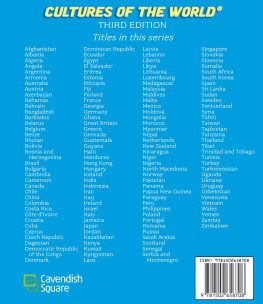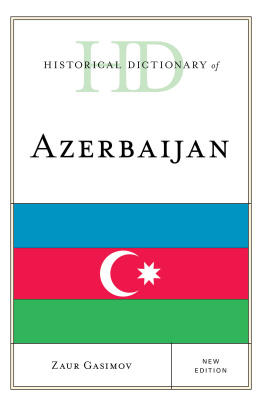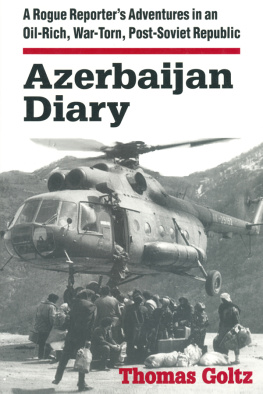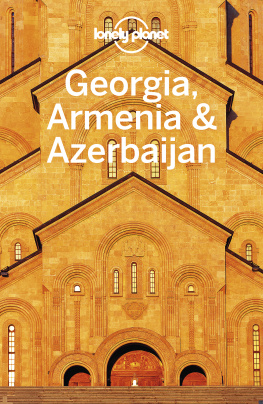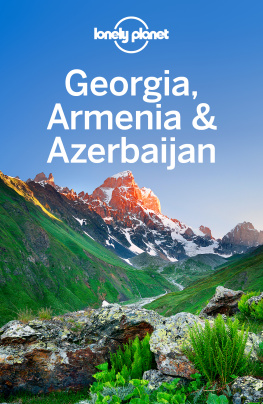Splendid Azerbaijan
About the Author
Born in Mexico, Glen Alberto Salazar grew up in California. He holds a bachelors degree from UC Berkeley. In addition to writing he enjoys Azerbaijani history and culture, especially its language, poetry, and art. He currently lives in Northern California.
Also by Glen Alberto Salazar
A Little Book of Persian Poetry
A Little Book of Haiku
Pistachio the Squirrel
Splendid Azerbaijan
The History and Culture of the Land of Fire
Glen Alberto Salazar
Nectar Books
To a land and people with a blazing heart!
Contents
Map of Azerbaijan
Introduction
History of Azerbaijan
Culture of Azerbaijan
Conclusion
Picture Album of Azerbaijan
Azerbaijani Language
Azerbaijani Alphabet
Azerbaijani Words and Phrases
Further Reading
Map of Azerbaijan
Introduction
Qonaq evin nurudur.
A guest is a light in the home
- Azerbaijani proverb
S plendid Azerbaijan : The History and Culture of the Land of Fire is written as a light introduction to this mystical Eurasian land inhabited by this charming Turkic people. My heart fell in love with Azerbaijan after Ell and Nikki delivered an electrifying performance and won the Eurovision Song Contest 2011, held in Dsseldorf, Germany. That night was charged with euphoria as the duo ran on stage and celebrated in front of Europe. Running Scared was their song entry that gave Azerbaijan its first sweet taste of Eurovision victory.
Azerbaijan went from terra incognita in the minds of Europeans to touching their hearts and souls. As a token of victory, Baku hosted the Eurovision Song Contest 2012. The design and spirit of the contest were kindled by the motto Light your fire! The motto was inspired by Azerbaijans nickname the Land of Fire.
Although I have studied Turkey and the Turkic peoples, I decided to write a book about Azerbaijan due to its flair as a Eurasian melting pot. As I began to explore Azerbaijans sizzling hot culture and history, I became seduced by its scents and flavors.
Azerbaijan is a country that attracts me with its unique identity. It is a land born from the bittersweet affair between Turan, the mythical homeland of the Turkic peoples, and Aryana, the mythical homeland of the Aryan peoples. Like fire and water, Turan and Aryana (from which the name Iran derives from), rage with each other passionately in their hearts, according to the Shahnameh , The Book of Kings , written by medieval Persian poet Ferdowsi.
In modern times, Azerbaijan has been of vital geostrategic importance. Located at the crossroads between Europe and Asia, and rich in petroleum and other natural resources, Azerbaijan has become a prized possession on the geopolitical chessboard between East and West. In fact, Nazi Germanys thirst for oil was what led to its attempt to brake through the impenetrable Caucasus and reach the Caspian oil fields, during World War II. Stepping out from the shadow of its Soviet past, Azerbaijan has rekindled its connection to Turkey, Iran, and the Turkic lands to the east.
The pulsating echoes of Azerbaijans past and present are being heard not only in Baku and Nagorno-Karabakh, but also in Tabriz and the whole of South Azerbaijan,
under Iranian rule. In spite of the prickly challenges that lie ahead, the dazzling colors of the Azerbaijani people through their history, their culture, and their language are painting a bright horizon for the future of their splendid land.
History of Azerbaijan
Bir kr yksln bayraq, bir daha enmz!
The flag once raised will never fall!
- Mammad Amin Rasulzade
A zerbaijan means the Land of Fire in Modern Persian. The etymology of Azerbaijan derives from the Persian word azar meaning fire. The Persians gave it this name in reference to the Zoroastrian fire temples that were fuelled and lit by the plentiful supply of oil found beneath and on the surface of its Caspian Sea coast.
Geographically Azerbaijan lies at the heart of Eurasia, in the Caucasus, a mountainous region where magic and folklore live and breath. In Greek mythology, Prometheus is chained to the Caucasus by Zeus as punishment for having rebelled against his wish of hiding the secret of fire from humanity. Prometheus pays his sentence by having his liver eaten daily for eternity by an eagle. In the Golden Fleece , the Greek hero Jason and his band of Argonauts sailed to the west coast of the Caucasus in search of the fleece of the gold-hair winged ram held in Colchis.
The Caucasus region is where Europe and Asia collide. Europes highest mountain, Mount Elbrus, is located in the Northern Caucasus, under Russian rule. The Southern Caucasus is politically divided into Georgia, Armenia, and Azerbaijan.
Gobustan is an archeological site south of Baku that dates back to the prehistory of Azerbaijan, approximately 12,000 years ago. The site is rich in carved drawings etched on mountain rocks that depict images of man, battle scenes, camel caravans, ritual dancing, fishing and the natural world. These ancient rock engravings along with the remains of Stone Age inhabited caves, settlements and burials, are part of the Gobustan National Park, a UNESCO World Heritage Site.
During the Bronze and Iron Ages, various Caucasian peoples appear to be the earliest inhabitants of the South Caucasus. The Caucasian Albanians are believed to be the first to inhabit the land that would become Azerbaijan. The Sumerians and the Elamites were two Near Eastern peoples and civilizations that stumbled upon each other in ancient Azerbaijan, sparking a rivalry between Mesopotamia and the Iranian plateau that would continue to modern times.
In the 9 th Century B.C., the semi-nomadic Indo-European Cimmerians and Scythians invaded from the Northern Caucasus. From at least 700 B.C., the Pontic Greeks began arriving from the Pontus region on the eastern corner of northern Anatolia and established colonies in the Western Caucasus, along the shores of the Black Sea. Around 550 B.C., Cyrus the Great defeated the Median Empire and conquered the South Caucasus, bringing all of Azerbaijan into his Persian Empire. Cyrus became the first Shahanshah King of Kings of Persia, constructing his capital Pasargadae in the province of Pars, near present-day Shiraz. The empire he built is arguably the first world empire in history. The Cyrus Cylinder, housed in the British Museum in London, is considered by some to be the first human rights charter in history. In 1971, the United Nations declared the document made of clay as an ancient declaration of human rights. Under Achaemenid rule, Persian became a lingua franca throughout the Near East. In Azerbaijan, Zoroastrianism and Persian culture bloomed. The Caucasian Albanians embraced the teachings of Zoroaster and became known as fire-worshipers as a result of their Persianization.
Darius the Great brought the Achaemenid Empire to its zenith by initiating the building of Persepolis around 515 B.C. Persepolis is located in the sun-scorched plateau of Persia, northeast of Shiraz. It is listed as a UNESCO World Heritage Site. Among the present day ruins lie the remains of the Gate of All Nations and the Apadana Palace.


